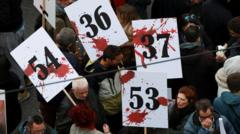In Athens, a sea of protesters gathered in Syntagma Square, some carrying placards honoring the victims, as a general strike underscored the seriousness of their message. The tragic event, which occurred on February 28, 2023, involved a packed passenger train colliding with a freight train, ultimately sparking public anger towards the government for alleged negligence and lack of proper safety measures.
Among the protesters was 13-year-old Dimitris, who joined his father in the rally to demand accountability. "I am here in memory of the people who were killed in the train crash. We demand justice," he said, as many attendees shared similar sentiments, wearing shirts stating “I have no oxygen – justice to the end.”
The inquiry into the incident, finalized just days prior, attributed the crash mainly to human error, poor maintenance, and insufficient staffing, stating that systemic safety shortcomings remain unaddressed. The investigation condemned foul play, with many citizens suspecting that government officials are concealing critical facts about the tragedy.
Protests extended beyond Athens, spreading to 346 cities in Greece and internationally, with rallies in various European capitals. Citizens across all age groups participated, underlining the deep emotional impact of the crash on Greek society - one that has moved beyond financial grievances, calling instead for justice and accountability.
Clashes broke out between protesters and police as tensions escalated, with police utilizing tear gas in response to petrol bombs thrown by some demonstrators. Amidst the unrest, those in attendance remained focused on calling for justice.
In a statement, Prime Minister Kyriakos Mitsotakis expressed condolences for the victims and recognized the need for safer train systems, promising accelerated efforts towards reform. Yet his government now faces criticism over corruption-related accusations connected to the stalled implementation of railway safety upgrades.
As the investigation continues, the fallout from the disaster has sparked deeper inquiries into how much information may have been lost in the aftermath, with accusations of a cover-up looming over the government. The national mood serves as a potent reminder of the collective grief, unity, and demand for transparency among the citizens of Greece.
Among the protesters was 13-year-old Dimitris, who joined his father in the rally to demand accountability. "I am here in memory of the people who were killed in the train crash. We demand justice," he said, as many attendees shared similar sentiments, wearing shirts stating “I have no oxygen – justice to the end.”
The inquiry into the incident, finalized just days prior, attributed the crash mainly to human error, poor maintenance, and insufficient staffing, stating that systemic safety shortcomings remain unaddressed. The investigation condemned foul play, with many citizens suspecting that government officials are concealing critical facts about the tragedy.
Protests extended beyond Athens, spreading to 346 cities in Greece and internationally, with rallies in various European capitals. Citizens across all age groups participated, underlining the deep emotional impact of the crash on Greek society - one that has moved beyond financial grievances, calling instead for justice and accountability.
Clashes broke out between protesters and police as tensions escalated, with police utilizing tear gas in response to petrol bombs thrown by some demonstrators. Amidst the unrest, those in attendance remained focused on calling for justice.
In a statement, Prime Minister Kyriakos Mitsotakis expressed condolences for the victims and recognized the need for safer train systems, promising accelerated efforts towards reform. Yet his government now faces criticism over corruption-related accusations connected to the stalled implementation of railway safety upgrades.
As the investigation continues, the fallout from the disaster has sparked deeper inquiries into how much information may have been lost in the aftermath, with accusations of a cover-up looming over the government. The national mood serves as a potent reminder of the collective grief, unity, and demand for transparency among the citizens of Greece.



















